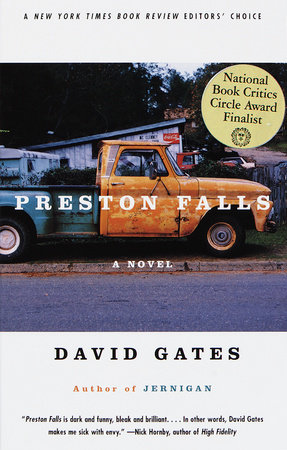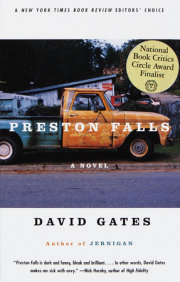Late Friday afternoon they start for Preston Falls: Jean and the kids in the Cherokee, Willis in his truck, with Rathbone the dog riding shotgun. When Willis proposed that Roger ride with them and make it an all-male expedition, Roger said, "I don't want to." The one boy in America ashamed to be seen in a pickup truck. Or was that not the problem?
Among his colleagues (a word he precedes with a half-beat's hesitation, to suggest quotation marks) Willis keeps dropping the odd allusion to his truck, lest they forget he's a badass outlaw. And five mornings a week it's his fuck-you to the Volvos in the commuter lot at the Chesterton station. A '77 Dodge V-8, with mustard-yellow paint flaking off to show the original dark green, patches of gray Bondo on fenders and rocker panels, and--this is the best thing--a black driver's-side door that must've come off a whole different model, because the chrome doesn't line up. He spotted it one weekend in Want Ad Digest: "4WD, some rust, runs good." Guy wanted eight, Willis beat him down to seven, then put another seven-fifty into it, not counting five for a pull-out tape deck and decent speakers; so for fifteen hundred smackers he's got himself the hillbilly shitheap par excellence, complete with old-truck smell, but actually semireliable. Willis is Director of Public Affairs for Dandineau Beverages, bottlers of Sportif, the original caffeine-laced Gatorade knockoff, plus the line of flavored iced teas without all the minerals and shit.
Jean backs the Cherokee out of the driveway, then sets the hand brake and walks back to the truck. "You want to lead the way?" she says. Otherwise she's going to have his damn headlights in her mirror the whole trip.
"Ah," he says. "The alpha dog and his dog." One of his jokes, or whatever they are. He salutes, touching the visor of his Raiders cap; she looks up at the embroidered pirate, complete with cutlass and eye patch. This is going to be a long weekend. In both senses. Tomorrow Willis's brother is coming up, probably bringing the girlfriend, and the Champ-and-Willis show can be wearing. Waiting behind him for the light at the corner of Route 9, she sees him reach across and stroke Rathbone's head and say something. Probably That's my boy. Melanie, who won the coin toss for front seat, says taking two vehicles is wasteful. Jean walks her through it: Daddy's staying in Preston Falls and they have to come back to Chesterton Monday night, because Tuesday's the first day of school and a workday, and because Aunt Carol's coming Tuesday night. Mel says, "Right, I know all that. I'm not stupid, Mother." Roger's by himself in the back, going Poom, poom. He's found his old Shredder action figure in the little storage thing, and he's working its bendable arms to make it punch itself in the face.
She follows Willis's truck to the McDonald's just before the Tappan Zee, their traditional Friday night stop when they first bought the place in Preston Falls. When he pulls up to the squawk box, Jean watches him talk down from his window, then ceremoniously touch his cap again; the truck lurches forward to the pickup window. She can hear that he's got music going, but she can't make out what. She orders a chicken fajita, the only thing even vaguely healthy. Roger orders all the stuff in a Happy Meal but won't call it a Happy Meal, and she thinks, Well, good for you: you're not buying into that at least. (Putting on the most hopeful interpretation.) Melanie won't eat anything from McDonald's. She's brought along rice cakes in a plastic bag and insists on eating them dry.
Willis has finished his Big Mac and fries before they even get on to the Tappan Zee, and Rathbone guzzled down his plain burger in three jerks of his head. The Friday of Labor Day weekend at six o'clock: could they possibly have timed it any worse? Traffic on the bridge creeping and stopping, creeping and stopping, Willis sweating like a bastard in the heat and golden glare, trying not to look at his temperature gauge too often, worrying about his clutch. He snaps the tape deck off; at zero miles an hour, Steve Earle is just another fucking irritant. Poor Rathbone has his head out the window, panting, sides heaving, tongue dripping drool. Willis unsnaps his seat belt and takes his eyes off the road long enough to lean down and swish a finger around in the weighted dog dish on the floor, hoping the sound will remind Rathbone. Rathbone looks over, and Willis says, "Yes, water. You know, water? Lap lap lap?" He turns back to the traffic just in time to see a Lexus cut in front of him. He yells that the Lexus is a cocksucking son of a bitch, but its tinted windows are up.
Back in the Cherokee, Jean's running the air conditioner, but if this traffic doesn't start moving, she's going to have to turn it off and open the windows, because the needle's creeping up toward the red. There's probably some music all three of them could agree on, but she doesn't have the energy for negotiations. Maybe Mel and Roger will be on better behavior when her sister gets here. Carol said she'll stay in Chesterton for September, and perhaps into October. Because she misses fall in the Northeast. Jean supposes anything's possible.
"How come Daddy gets so much vacation and you don't?" says Mel.
"It's not actually vacation," Jean says. "It's a leave of absence."
"Oh. Well, excuse me." Mel opens the glove compartment, takes out a tape--Jean can't see what--then tosses it back in, making the plastic clatter. "In answer to your question," Jean says, "I haven't been at my job as long as Daddy's been at his. And anyway I can't afford to just take two months off." Jean is the in-house design person for The Paley Group, a firm of investment consultants. After she took the job, Willis started doing a little faux man-of-the-people riff, where he'd go on about how the whole stock market was a conspiracy to bleed the working stiff.
"Can Daddy afford it?" says Mel.
"So he says. He worked the numbers on the computer, and he thinks we might
actually make out a little better because of taxes."
Willis is far up ahead; she's let three cars bully their way in front of her. She sees his palm banging on the roof of the truck.
"I don't get it," says Mel.
"I'm still hungry," Roger says. "You just ate," says Jean. Then, to Mel: "If you make
less money, your taxes are lower."
"I know," Roger says, "but I still am."
"You'll just have to hang on," says Jean. "There should be food up at the house."
"But I might be asleep then."
"Why don't you just go to sleep now, Roger?" says Mel. "So, Mom? He's just going to stay up there and work on the house the whole time?"
"I don't know how much he'll actually get done. I think he really just needs to get away."
"Yeah, right," says Mel. "Away from us."
"That's not so," Jean says. "Everybody needs to recharge sometimes."
"Yeah, right," says Mel.
"Are you disappointed that he's not coming back down for the first day of school?"
"Why would I be?" says Mel. "I mean, I've already had like how many first days of school in my life."
"What about you, Rog?" says Jean. "Do you feel disappointed that Daddy won't be there?" This is dancing on the line between encouraging them to voice their feelings and egging them on against their father.
"I don't care," Roger says. "Mom, I'm really hungry. I'm not kidding. How much longer is it going to be?"
"Quite a while," says Jean. "Especially with this traffic."
"But like how long?"
"I don't know. Maybe another four hours?" This sounds terrible. "Three and a half?"
Roger throws Shredder to the floor and says, "Shit."
"You have a time-out," says Jean. When they're in the car, this means nine minutes without speaking. One minute per year. In the mirror she sees Roger shrug and mouth Shit shit shit.
Copyright © 1997 by David Gates. All rights reserved. No part of this excerpt may be reproduced or reprinted without permission in writing from the publisher.
































































































